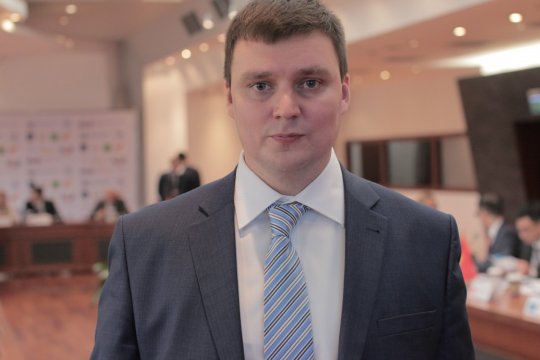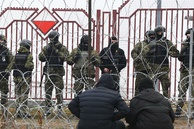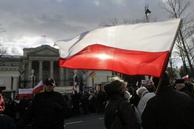Foto: Y. Pedanov
Moscow was recently playing host to the 6th Forum of Young Diplomats, which was the most representative such gathering held so far, bringing together delegates from 14 countries. An International Affairs correspondent talked with Konstantin Kolpakov, the chairman of the Young Diplomats’ Council of the Russian Foreign Ministry.
International Affairs: Deputy Foreign Minister Alexander Pankin believes that it is easier for young diplomats to find a common language. Is it really what happens when you are communicating with your foreign colleagues?
Konstantin Kolpakov: Well, we certainly feel less burdened by the magnitude of big-time diplomatic issues tackled by our senior colleagues. In Eurasia we speak the same language – Russian - which is certainly a big factor in bringing us closer together. We share a common culture and history, so it was God Himself Who commanded us to work together, unite, and jointly defend our countries’ national interests.
International Affairs: How are you communicating with your European and American colleagues?
“We are putting emphasis on informal contacts.” (Konstantin Kolpakov)
Konstantin Kolpakov: What we now see happening in our work with our European and North American colleagues is the initial sense of mistrust on their part during our meetings and forums, a mistrust based on stereotypical perception of the current situation in international relations. However, as soon as we start to talk we see that, at some point, tensions subside and the dialogue warms up. We noticed that as part of the work being done by the Young Diplomats’ Council and meetings held at the Moscow Diplomatic Club, which we created at the end of 2018, we have been joined by representatives of countries, like the United Kingdom, who would like to engage in this kind of interaction with Moscow. We have also talked with representatives from Germany, France and Italy, as well as those from some Eastern European states. Therefore, we believe that such a format really allows us to expand the scope of communication between official representatives meeting in an informal setting. We focus on informal communication. First of all, we are only human. When we have good communication as humans, it is easier for us to discuss problems now existing in relations between countries.
International Affairs: Alexander Pankin says that thanks to the Internet and social networks, young people now find it easier to get information and make contacts. Can we say that the realm of digital diplomacy is now being handed over to the Young Diplomats’ Council for outsourcing?
“We certainly feel less burdened by the magnitude of the big-time diplomatic issues tackled by our senior colleagues.” (Konstantin Kolpakov)
Konstantin Kolpakov: The use of social media is being actively discussed these days. Alexander Pankin and Leonid Slutsky both talked about how this could be applied in the field of parliamentary diplomacy. I believe that technology is indeed moving forward. There are various ways people can communicate with each other, and such platforms, above all social networks and instant messengers, are something the YDC heavily relies on in its communication with its colleagues, including foreign ones. It is quite easy when we communicate with each other, make plans and inform each other about upcoming events. This is not to say, however, that the YDC has taken on the field of digital diplomacy, of course not. This is mainly done by the Foreign Ministry’s Department of Information and Press.
The YDC is currently managing Sergei Lavrov’s Instagram account. I’m proud to say that we have the largest number of subscribers among the G20 countries, all this thanks to the work done by our young diplomats. We are now ahead of both US Secretary of State Mike Pompeo and our direct, in the good sense of this word, competitor – former Indian Foreign Minister Sushma Svaraj. Moreover, we are trying to develop this instrument of communication, which helps us achieve the goals of traditional diplomacy.
International Affairs: What are young diplomats lacking when compared with the older generation?
“When we have good communication as humans, it is easier for us to discuss problems now existing in relations between countries” (Konstantin Kolpakov)
Konstantin Kolpakov: Well, the new generation is a bit different, but, thank God, there is an institution of mentorship existing within our Foreign Ministry. I think that what the younger generation of diplomats lacks most is patience. This is a kind of a skill that you develop with time, but young people just want to do a lot of things here and now. When you graduate you think: “That's it! Here is a lever I can use to turn the international situation all around.” However, international relations are a very profound and complex field which, just like many other professions, such as medicine, you need a whole life to master. We are learning the art of diplomacy all our life, but will hardly be able to ever learn all of its workings. We have acquired certain skills, we can improve them, but diplomacy is as comprehensive and diverse as is man and human life itself. That’s why we need to be patient and listen to our older comrades. When it comes to digital diplomacy, however, young diplomats are way more active than their older colleagues, and they make it instrumental in their effort to achieve the goals of the Russian Foreign Policy Concept. Young people are more technologically savvy too. What they also need is hard work and a desire to constantly improve their skills. I hope everything the YDC does is contributing to this.
International Affairs: Is the idea of the Eurasia forum your initiative or just a task set for you by someone else?
“The YDC is currently managing Sergei Lavrov’s Instagram account” (Konstantin Kolpakov)
Konstantin Kolpakov: In our work we primarily have in mind how useful it can be to what is being done by our Foreign Ministry. Simultaneously, we are certainly trying to bring up certain topics for discussion. In this particular case it so happened that we met our young colleagues from the Eurasian Economic Commission (EEC) and we thought: why not have a plenary session held as part of the Young Diplomats’ Forum to discuss these issues, especially in view of the first anniversary of integration in the Eurasian space? I think this idea fit the meeting’s agenda just fine because we are all representatives of Eurasian states and, of course, there are very active economic, integration processes now going on here. This was our own idea, meaning that we didn’t get it from anyone else. Of course, we had agreed this topic with our older comrades, who were foursquare behind it.
International Affairs: You said that the YDC will appear in Belarus. What other countries are taking interest in such structures?
“Diplomacy, just like medicine, is a profession you can spend your whole life to master” (Konstantin Kolpakov)
Konstantin Kolpakov: We have one already at work in Belarus. As far as we know, there are similar organizations currently existing in Abkhazia, Belarus and the United Arab Emirates. They told me that there is a council of young specialists at the Foreign Ministry of Kenya. We are checking this information now. A council of young specialists has also been set up at the EEC, and since they all have a diplomatic status, we could call it the Council of Ministers of the Eurasian Economic Commission. Work is currently under way to establish such councils in five EAEU member-states. We do hope that within the next year or year-and-a half they will all be there. Then we can talk about creating an Association of Young Diplomats of the EEU. This is the goal we have set ourselves for the near future. This, in turn, will set the stage for the creation of the International Association of Young Diplomats, which was announced at the close of 2017.
International Affairs: Are you already coordinating your work now?
Konstantin Kolpakov: Of course, we have a mechanism of bilateral consultations we regularly hold with our colleagues. By the way, it is on the sidelines of this forum that we are going to have the next round of bilateral consultations between the Council of Ministers of the Republic of Abkhazia and the Russian Foreign Ministry. We have also scheduled a series of meetings and consultations with our colleagues from the Young Diplomats’ Club of the Republic of Belarus to be held this fall. It will most likely come at the end of September on Belarusian territory. We work according to the “one year at our place, another – at our partners” principle. We are now working very actively to sign a memorandum of cooperation with our colleagues from the UAE. We plan to have this done already before this year is out.
International Affairs: Another Deputy Minister Alexander Pankin noted that working on the Eurasian track is as prestigious as working in the UN. Do you agree?
“As far as we know, there are similar organizations currently existing in Abkhazia, Belarus and the United Arab Emirates.” (Konstantin Kolpakov)
Konstantin Kolpakov: Absolutely. The foreign policy concept of the Russian Federation prioritizes interaction with the CIS countries. This is no coincidence. Having around friendly countries and close economic partners, Russia will grow faster economically itself. By creating a successful region of Eurasia, and then Big Eurasia, we will strengthen our position in the world. If we are talking about the UN - this is a wider platform, a different experience. If we are talking about Eurasia – it is a platform that we already know well and which is easier for us to deal with. That being said, it still has its own challengers, prospects and tasks. It is just as interesting as working on an international, UN track.
International Affairs: What other areas are young diplomats interested in today?
“I would single out the growing importance of economic diplomacy” (Konstantin Kolpakov)
Konstantin Kolpakov: First, I would single out horizontal diplomacy. The concept of horizontal diplomacy now being developed by the YDC envisions the creation communication platforms for young diplomats from around the world. This is exactly what we are doing now, and forums and bilateral consultations are already the result of the implementation of this concept. Such initiatives are actively supported by young diplomats, who find many interesting things for them to work on. If we are talking about where professional diplomacy is now heading, I would single out the ever-growing importance of economic diplomacy. During last year’s meeting of ambassadors and permanent representatives of the Russian Federation in the world, the president set forth the goal of promoting the economic interests of the Russian Federation. If we are talking about non-traditional diplomacy with its wider range of young experts, this is, first of all, scientific diplomacy, parliamentary diplomacy and exchange diplomacy between universities and schools.
“We always honor the traditions of the diplomatic service” (Konstantin Kolpakov)
This also includes a variety of civil initiatives being launched by non-governmental non-profit organizations working in the world. I would like to mention here measures to popularize the cultures and languages of Russia and its peoples abroad, which is what Rossotrudnichestvo agency is doing today. I would like it to be a solid, monolithic and easy-to-understand system that would promote the interests of the Russian Federation on the widest possible scale. I believe that all necessary prerequisites for doing this are already there.
International Affairs: What are your expectations from the forum? What are the goals you have set yourself for next year?
“The creation of a Young Diplomats’ Association of the EAEC is the goal we have set ourselves for the near future.” (Konstantin Kolpakov)
Konstantin Kolpakov: Our goal is the further evolution and development of the platform. We see the results that have already been achieved. It is the first time we are doing this with a partner like the EAEU. We are also talking about a Young Diplomats’ Council now being created within the EEC framework. We are on the way to establish a Young Diplomats’ Association of the EAEU. In another first, we also have bilateral consultations now held on the sidelines of the forum. We have already combined several events. While previously we focused only on one thing, we now have consultations, panel meetings, and work on the final declaration. We want this declaration to highlight what we discussed for two days, and focus on endorsing the proposal to create an International Association of Young Diplomats and, as I said, a Young Diplomats’ Association of the EAEU.
An equally important topic is that the year 2019 marks the birth anniversaries of prominent diplomats, such as Gromyko, Primakov and Dobrynin. As part of our forum, the YDC has prepared a short film dedicated to Yevgeny Primakov. We always honor the traditions of the diplomatic service that existed, exist and will continue to exist in Russian diplomacy.
read more in our Telegram-channel https://t.me/The_International_Affairs

 20:53 12.07.2019 •
20:53 12.07.2019 •

























